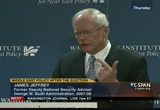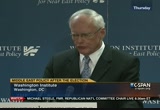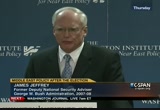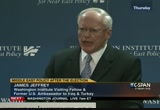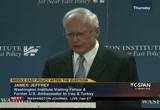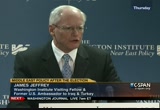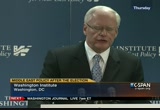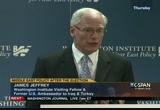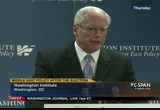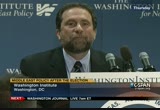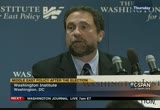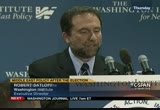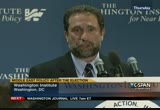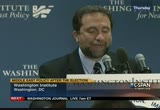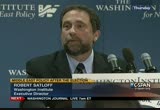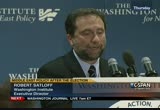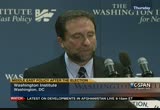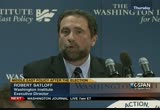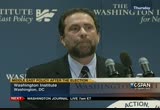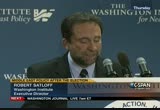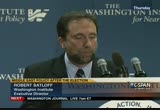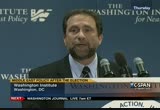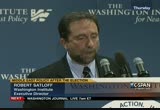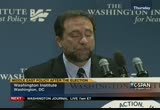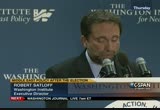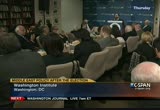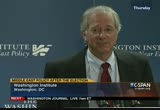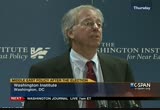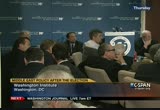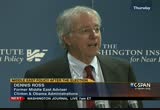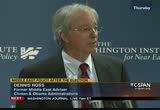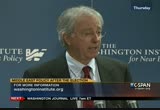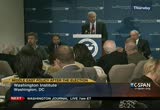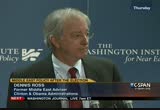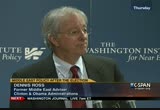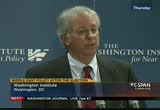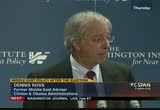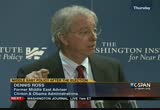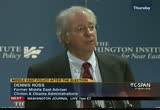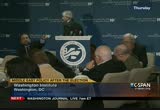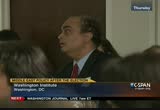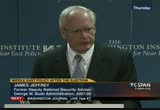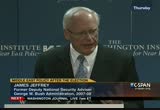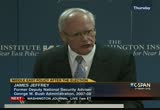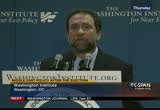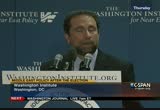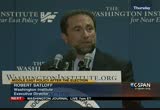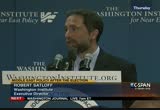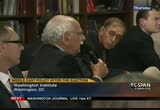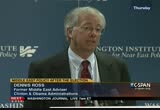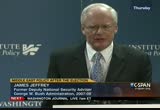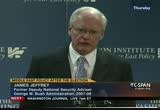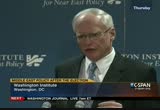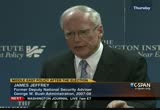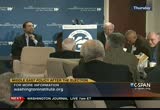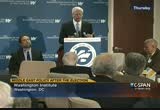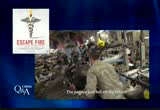tv Washington This Week CSPAN November 11, 2012 6:00am-7:00am EST
6:00 am
all policy, intelligence policy including covert operations. we have the military wing of our operations, and we have diplomacy including the nuclear account. it is very important that this be closely coordinated on a daily level. we hope that the administration will take a look at how that can best be done. it cannot be business as usual asiran in the year it was written about the way the u.s. government organized itself at that level to deal with the reactor in syria. the bush administration organized its iraq policy in another way. there are several models out there but it is important that i ran not be seen as one of 10 or
6:01 am
15 problems we have to deal with on a daily basis. iran is problem number one and will be for awhile. there are plenty of other problems in the middle east. first, syria -- i concur with everything dennis said. first of all, for the longest time, many people thought the fall of assad was inevitable so we would not have to do that much to provoke it. i'm not so sure, not because i don't think this insurgency is effected. i have been on the receiving end of a number of insurgencies in my career is. this is a very powerful and effective one. iran has command -- has committed -- syria has committed powerful friends that appear to be ready to go to the mat to make sure the assad regime will stay in power.
6:02 am
that is russia and iran. the result could be an assad that stays in power, an iranian victory that will mark the good for our efforts to move iran to the negotiating table on nuclear weapons, and, in wide portions of syria, and no man's land like the somalia were militants associate with al-qaeda will find a new home. we already see some of this. this is another reason why the administration needs to engage through military means of necessary directly or indirectly providing weapons and things like no-fly zones. we need to do more urgently and this thing will slip out of control. at best, in syria, we will see an emerging shia-sunni fissure
6:03 am
across the middle east that will be followed by fighting. but a touch on iraq -- it has not received too much commentary you -- either in the debates in the campaign or even in some of the discussions about the post-election foreign policy priority but it needs to be a priority for several reasons. iraq is a success. it is because of the efforts of the united states and our allies and iraqi people. it is an important success because it is right in the middle of the middle east. it ties into every other problem from iran to sunni-shia relation and energy. it is a democratic state with a lot of flaws. it is a functioning democracy and that is a good day and we need to do our best to continue to encourage. the administration is putting a
6:04 am
lot of quiet effort into this and this needs to continue. there are several serious risks. the biggest is that syria will pull iraq asunder as the various groups go in various directions. so far, that has not happened but the longer the situation in syria is allowed to continue, the more likely that very bad scenario will occur. one of the main reasons we kept our troops in iraq and lost 4500 tubes was to maintain the unity of iraq. that depends on plurality and democracy. that's all we have now with all its faults and the need to be supported. the other major threat is the debate, struggle, disputes between the kurds in the north and the central government under prime minister maliki. that is a complicated issue but one of the factors playing a huge role is oil.
6:05 am
oil is either the glue that will hold iraq together with kurdistan contributing to some degree to the massive increase in iraqi exports we will see by the end of this decade. 45% of all new crude-oil that will come on the international markets is predicted to come out of iraq mainly from the south but some from the north if all goes well. that is a big if and that is something we have to play a huge role in. the administration has been engaged in working a deal like currently is in place to get the kurdish oil in the north exported to turkey out of pipelines controlled by the central government but it is a difficult balance and is being pulled in different directions. the iranians are potential players in this and they're not too happy in the increase in exports. this is an area where the
6:06 am
administration needs to continue its focus. finally, on al qaeda -- this remains a very dangerous threat not only for us but to this -- but to stability in the region. there's a new factor that we saw in iraq and did not think we would see elsewhere and that is al qaeda portraying itself as the champion of the sunni moslems against the shia muslims. zakiri was pushing this, that the target should be americans rather than shia moslems. by the time i was in iraq, al- qaeda was leaving us alone. that is because we were heavily armed but there target preference was the shia. we see this again in syria and this is a bad development. it can tear the region apart. we went to war twice in the
6:07 am
balkans in bosnia and kosovo to prevent a split along religious lines. the middle east is far more important and far more dangerous in the balkans. we need to watch this. finally, on al qaeda -- for various legal and political and domestic reasons and diplomatic reasons, we see this as a war but we have not done a good job explaining to the american people the implications of that. if it is a war, why do we put these people on trial? this is a complex issue that is now crystallized in the criticism of the drones. we don't want to have a lack of clarity about our goals and our tools lead to a situation where we are afraid to go after these people because we don't think we have enough legitimacy, we don't
6:08 am
think we have enough support from the american people. throughout the broader middle east in the areas where there is not effective government control, al-qaeda or groups elected to them pop up and they are a threat to the stability of the region and us and they need to be kept under the highest pressure. i will stop there, thank you very much. [applause] >> let's imagine for a minute that there is a courageous national security council staff member was writing a memo to the president out lighting middle east policy for a second term or maybe he is not such a courageous staffer and he already has a job lined up outside government. he might offer the following remarks to the president --
6:09 am
four broad lessons i urge you to take from your first term experience -- one, it is a mistake to think one can't have it away from the middle east and toward asia as though we just have a fix the amount of bandwidth and the luxury of reapportioning it based on our preference. for the foreseeable future, we cannot avoid dealing with threats and talent is emanating from this region. two -middle east politics, mr. president, revolves around two main threats. one is the end visions of a hegemonic iran and the spread of radical sunni extremism. this is what defines middle east politics in the early years of the 21st century. other issues such as the israeli-palestinian conflict are important especially important to israelis and palestinians but have little impact on the larger
6:10 am
scheme of things. 3 -- in this part of the world and perhaps elsewhere, there are perhaps few happily ever after. what starts with hope and inspiration rarely ends that way. look at the bloodless revolution in syria, the spirited to rear square, the courage and look where they are all today. anyone who followed the opslo process through the last 90 years learn this lesson a long time ago but you, mr. president, weren't for the first time. last, as an overall lesson, as much as words matter whether it is the cairo speech he delivered in 2009 or your repeated at important declarations on prevention of the iranian nuclear capability, actions matter most. do not mistake the former for the latter.
6:11 am
i have to step out of my role for a moment because as an historian, today is the anniversary of my favorite ever presidential statement on the middle east. 70 years ago today, president franklin delano roosevelt issued the following statement to the peoples of the middle east -- imagine a president saying this -- "praise be done to you under god the compassionate and made the blessing of god be upon you. this is a great deal for you because behold, we, the american holy warriors have arrived. we have come here to fight the great jihad of freedom. we have come to set you free. today is the 70th anniversary of the landing on north africa. imagine an american president praising the great jihad of american freedom. we don't remember that because
6:12 am
of words matter so much less than actions. all right, if those are three broad lessons, what are the three most urgent issues of your agenda? i will not repeat the words of my colleagues because i ran nuclear negotiations are number one and bringing down assad as quickly as possible is number two but the third is the following -- preventing the collapse of one or more additional pro-western regimes especially pro-western monarchies. three are at the top of the list -- bahrain, jordan, and morocco. morocco has figured out a recipe for its survival bahrain has big brother saudi arabia looking out for it. jordan, however, is the most vulnerable and the one whose loss would undermine u.s. interests in multiple and immediate ways. for the life of me, i have not heard a good explanation as to
6:13 am
why the saudis are providing virtually no assistance today to jordan. as a corollary, i can understand why the saudis are providing virtually no assistance today to egypt. think of what is going on in jordan and egypt today. these two countries, each of whom borders the world's most resource-rich, energy-rich part of the world, today, are undergoing a rather draconian restrictions on the uses of energy. the lights are out in cairo every night at 10:00 and jordan has-rations. the live virtually right next door to saudi arabia. who are the three leaders who deserve special attention, mr. president? first, let's start with the prime minister of israel. if he gets another term as prime minister, he will be with you throughout your presidency.
6:14 am
locked at the hip or perhaps another part of your anatomy. [laughter] your interests state to state our confidence and complementary. you don't have to love each other but you have to out -- but you have a big agenda with each other, that requires you to work together. it is very important for mr. netanyahu to work together with few. you are the great power and israel is the small power. you have a role to play in building a new relationship with him as well. secondly, the second leader i would put on this list is the prime minister of iraq, prime minister of maliki. iraq is the third real of middle east diplomacy. it conjures up such bad memories
6:15 am
from the last decade but iraq is important. geography is destiny and iraq's geography between iran and syria is critical to the future of the middle east and to our interests in this part of the world. we have an important role to play with a prime minister of the democratically-elected government and we need to find a way to work with him better. third, the third leader i would focus on isn't a particular person. it is the next generation of saudi leaders. as my colleague noted earlier this week, there has already been the beginning of the jump to the next generation with the employment of a new interior minister from the next generation of saudi princes. the remaining sons of the founder may see their demise political as well as actuarial in quick succession during your next term as president. now is the time before that
6:16 am
happens to build deeper understandings on strategy and reform with the leaders that will come to take their place. what are three calamities we can prevent? i referred a moment ago to the demise of the hashima kingdom of jordan. secondly would be the collapse of the palestinian authority. it is a bit of a luxury to think about resolving the israeli- palestinian conflict over the next four years and that we of vital interest to the united states to prevent moving backwards in israeli- palestinian relationships and the most dangerous backward move would be the collapse of the palestinian authority. there are important measure the united states can do to help israelis and palestinians build on the less well-known but
6:17 am
important achievements that are in the way -- economic relationships, secure relationships, and help ensure that the palestinian authority stays intact at least to continue to provide the potential for renewed diplomacy in the future. the third calamity we can prevent -- the emergence of a lave in sinai. it is important it does not become the source of renewed conflict in the years ahead. we have an important role to play working with the government of egypt and with egypt and israel together, militarily and in terms of civilian investment to make sure that sinai does not become the fatah, or somalia or the source of exports instability throughout the area.
6:18 am
what are three big initiatives we can undertake? i will repeat one that dennis referred to which is rethinking our relationship with egypt under islamist world. our approach toward egypt if you look at the mechanics and tools we use is essentially a holdover from the mubarak era with a few band-aids on it. we have not really thought through strategy, policy, tools, and a method of implementation of a new relationship with islamic- government egypt. it is a whole range of items. secondly and more specifically, initiative related to egypt- israel relations -- there will not be a u.s.-egypt free trade agreement given all the uncertainty in egypt within the foreseeable future. if it is serious, egypt can reap many of the benefits of free
6:19 am
trade through a massive expansion of a qiz system with israel. israel would do this deal in a heartbeat and would lower the amount of is really content required as part of the deal. that would require the islamic president of egypt to recognize the benefits of much significantly broadened qic relationships and utter the word publicly -- israel -- which he has not done in his official capacity. a third initiative, repairing a turkish-israel ties. it is overdue and is in our interests and in the interest of both these countries. i know, mr. president, you tried wants to do this and did not succeed but times have changed. syria has happened. netanyahu will be stronger if he gets reelected.
6:20 am
after the politics is clarified, it is time to try this again. well, one last set of items -- what are the game changers'? what are the unknowns that every administration has to deal with at some point in this part of the world? succumb to all lack of adequate creativity but here, at least, are a handful of game changers that may occur on your watch for which we need to be prepared. first, the next wave mass protests. i already mentioned the possibility of jordan and bahrain. not rule out saudi arabia. after the events of 2011, who can say with 100% certainty
6:21 am
that the recent signs of some on rest, of some rioting, of some protests, may not catch fire even in saudi arabia. second, terrorism. this happened to president bush from on sort -- and unforeseen away - way and with president obama with the attacks in benghazi. we should not rule out the range of terrorist attacks and what that would do to america's relations and to america's set of priorities in the middle east -- taking down an airplane, blowing up embassies, attacking civilians, foreign governments with the attack on the saudi ambassador, foreign governments using terrorism even on our soil -- there is a whole range of possibilities here. let's not foreclose dealing with
6:22 am
them. third, a sinai clash on steroids -- we saw in august, 2011 how the attempt by terrorists to kill israelis triggered an israeli reaction that ended up with the egypt-israel peace treaty being this far away from total collapse. i measure this as being the thickness on the door of the israeli embassy in cairo outside of which the protesters were bending down the door to attack the israeli diplomats on the other side of the door. that was when the military- controlled egypt -- today is a different situation. another clash triggered by terrorists seeking to promote egypt-israel conflict is eminently possible. we have to prepared now to prevent a spiral escalation. fourth, we have warned about this with the potential of wmd
6:23 am
use in syria and massive numbers of american soldiers perhaps in concert with the troops from other nations in the conflict in syria. this would be a dramatic change on the ground and would transform not just the syrian conflict but would transform your hopes for keeping american boots off the ground in the middle east throughout your second term. fifth, a moment of opportunity perhaps -- the perhaps --redux. let's not rule out the possibility of this as the elections approach and i ran, there is a resurgence popular call for change on the streets -- streets of tehran. lusby prepared this time differently than last time. hopefully, we can move iran in a different direction. finally, something that dennis referred to -- the potential for
6:24 am
a surprise iranian breakup. this needs to be prevented at all costs. so far, as you have noticed, have avoided using the word legacy. remember this -- if you try to resolve all the other issues on this list or if you try to fix the israeli-palestinian conflict, for example, you may fail and people may never remember. after all, you will be the sixth president in a row to try and fail to solve the israeli- palestinian conflict. if, on your watch, i ran breaks up and achieves a nuclear weapon capability, this is what will be on your epitaph. you were the first president to be on his watch when i ran got the bomb. these are my suggestions, mr. president. i will take a vacation [laughter] thank you all very much.
6:25 am
we will open the floor for your questions. if you can please identify to whom you're making the question and i will ask my colleagues to come up here and respond for the benefit of the cameras. all the way in the far back, sir, there is microphone's around. police -- >> -- please -- >> [indiscernible] if the grand bargain that the administration is working on -- are you confident the president will enforce a military strike against iran? [indiscernible] do you know if that's true? >> i have no idea whether that's
6:26 am
true. i would be very surprised for it to be the case. the administration has plenty of highly skilled people who know the issue and are immersed in it. if there is going to be a negotiation at some point, i am confident it will include those people. i think there will be a negotiation and i think there'll be some kind of dramatic initiative that will be designed to test the proposition that the iranians want only what they say they want, meaning they said they want civil nuclear power. i can envision the kind of proposal that would allow them to have civil nuclear power but with restrictions that would prevent them to convert that to nuclear weapons capabilities. number two, i am convinced the president very seriously like to achieve this through diplomatic means but i'm also persuaded that there is a debate within the administration.
6:27 am
the president thought about it carefully between prevention and contentment and he made a conscious decision for containment. to a think he would act on it? i think he would act on it but like anyone, he would like to achieve this through diplomatic means. our best chance of achieving this through diplomatic means is continuing to have the pressure felt which it is and making it clear that when it comes to diplomacy, we want it to succeed but the iranians have more to lose from its failure than anyone else. >> [indiscernible] dr. satloff just suggested that
6:28 am
peace between the israelis and palestinians -- and palestinians is no longer a priority. what could happen to re-injects some life into this process? >> as i said, at a 14-point proposal and that you have asked me for it -- [laughter] i think the key is how do you preserve the possibility of a two-state out come when you have such a disbelief. i was trying to get at the disbelief of the commitment of the other side of the two states. the idea that you will somehow make peace in the context of complete disbelief is an illusion. somehow you have to try to restore belief or try to find some way to give a cite a reason to take a second look. when i outlined these 14 points,
6:29 am
i don't want them to be doing it unilaterally. the only thing it breeds is the worst kind of unilateralism you need to restore the faith. there has not been a loss of confidence. confidence you rebuild and restore it when you lose faith, it is fundamental and that somehow has to -- you have to work hard to rebuild that. i would like these 14 points that are designed to be an agenda for conversation. the conversations they have to they are mostly conversations or the passage of a. on the israeli side, the kind of agenda items i would like to see them be prepared to discuss with the palestinians would be to be prepared to offer compensation to and a settler who would be prepared to leave. illogic is that the other side is convinced that all you are
6:30 am
about is preserving your control or continuing to build, this is a way of saying this is not the case. second, start building houses within israel that would accommodate those who would leave. send a sampan of masses but it sounds a message to your settlers. but blocks definition is a% of the western barrier and the palestinians think it is less. when you bring in the blocks, you send a message. they are -- they would be building in the park that would be part of israel. area c is where palestinians have very little access.
6:31 am
all the rock quarries in the west bank are in the area c. one of the bigger industries the palestinians of the west bank is stone masson -- stone masonry but they don't have any rock quarries. i was a allow them greater economic activity in area c is not threatened security but it sends two messages -- that israel means what it says. is a way to signal that you mean what you say and at a time when the palestinians economically mean more -- need more to enhance their economic position, this would help them economically. fifth, area b is 27% of the west bank. the palestinians have some
6:32 am
responsibility for law and order but they don't have responsibility for security against terrorists. they have a police presence and i would like to see that presence built more and be allowed to expand it sends the same message about palestinians shaping their own future. sixth is area a where the palestinians have settle and security responsibilities and the israel's go back there in from time to time. the go in for security reasons. -- they go in for security reasons. those are six steps for the israelis. i said there are 14 but i will save it for the palestinian side. on the palestinian side, put
6:33 am
israel on the map. if you can't find israel on a map in any palestinian textbooks, you can find palestinian maps that show settlements but you cannot find israel on a map. put israel on a map. the second step would be to stop the incitement. when a square is named and a local town, let the palestinian authority not celebrate someone who killed israelis. start talking about two states for two people and acknowledged there is a jewish connection to the land. you don't have to go beyond that but acknowledged that israel does not undercut palestinian claims. it acknowledges the reality that you recognize the israeli flights. condition your people for peace.
6:34 am
i will quote arafat - he always said he is not asking for the moon. i am asking to take the template and say that we have hard decisions to make. the fifth step -- about five or six years ago it was said -- where does it say the palestinians have to live in squalid conditions? he was getting at the refugee camps. it did not actually happened. you don't have to say anything, just do it. start rebuilding the camps of the west bank. allow those who live within the camp to move out if they want. the sixth step is something
6:35 am
palestinians do for themselves. that is continue to build your own state emerald law. -- your own state and will rule old law. -- and rule of law. the better is for them but it sends the message to the israelis about what kind of state they will be. the seventh step is a mutual step -- the only israelis that palestinians see our israeli soldiers. it is very easy to dehumanize and those are the only ones you see. the relationship between them and soldiers is not the perfect relationship, to put it mildly. on the israeli side, about two months ago, we saw a lynching take place in jerusalem of palestinians. those involved said really awful things. the israeli government contemned
6:36 am
-- condemned what happened. israelis never see palestinians of all, basically. i would like to see, starting in the third of fourth grade, i would like to see an exchange of classrooms. not bringing people here but there. i want kids to start seeing each other because they will see each other as people. if we are going to change the dynamics of disbelief about each side's commitment to the state, this is where you start. if the two of them sat down and this is an agenda, they can have other ideas. if they say you take this step and i'll take that step, you create a virtual cycle and that can change the dynamics. anyone who thinks you can go ahead at this point and suddenly you will create an out, there is complete disbelief on both sides and you see it in what is
6:37 am
happening in the polling - up until about a year ago, is still showed a strong majority on each side for two states. they also did not believe it would take place. those numbers are dropping on each side and that is symptomatic of the display. political leaders are operating with disbelief are on likely to take big dramatic steps for peace. anyone who thinks they can create in that environment is kidding themselves. >> in the far back -- >> i want to follow up on what you were saying -- it seems the 14-point plan could form the basis for some kind of u.s. presentation of a possible step leading to a deal between you and ambassador jeffries, the
6:38 am
middle east peace process, obviously, while important, does not seem to be the first priority when you look at what is going on in the middle east. i'm wondering if that is because there is fatigue or there is so much more pressing interest between iran, syria, and the growing islamic threat or is it because the parties are not ready for a deal. present obama pledged to make this a priority. -- president obama pledged to make this a priority. >> obviously, an effort was made and it did not materialize but then it got swamped by a lot of other things. one of the most frustrating things for palestinians is that no one is paying attention to them. look at the region itself. the gulf states are focused on
6:39 am
iran, syria primarily, the merchants -- the emergence of the muslim brotherhood in egypt. they are focused domestically. you have all these other issues. you have this powerful new reality that is unfolding in the region but nobody knows exactly what it will mean. it has consumed everybody's attention. the reason i have been thinking of this is because the issue is not going away. we have an interest and not just letting it reached the point where the does believe become so powerful that becomes difficult to do anything at all. there are huge challenges throughout the region but i think it is a mistake to lose sight of this one.
6:40 am
>> dr, kumar, on my left. >> i have been essentially two questions -- with regard to the conflation of the death of bin laden - when will this realization sink in? when will these pronouncements be made that we still have a war to fight with al-qaeda? secondly, but closing of the moslem brotherhood-dominated government in egypt, what implications will it have for our relationship with israel and four israeli concerns that it will not impact the u.s.-israeli relationship.
6:41 am
>> i will try the first one. there is no doubt that al qaeda is much more on the ropes now than it was 5-10 years ago. this has been a success of the bush and obama administrations. the death of bin laden was the logical conclusion for the campaign that began almost a decade ago of targeting senior leaders. bush administration got zakawi in iraq in 2006, i think, and then bin laden and then the movement was decapitated. the movement has morphed in a different direction. probably, it is nowhere near as dangerous to was now as it was then but, as we have seen in
6:42 am
yemen, these are governed areas where it counts of a presence, people come in from america and they direct the threats and not just to local government which is one of the problems nor to the shia sect but also to get on up airplanes and kill americans and homeland. there is still a direct threat. it is not the same level as it was on or after 9/11 but it is still something we have to watch out for. at the same time, it is a threat to the region, as it always was, the shia-sunni divide and give it a real role in this is what we don't want. this is a region that kids looking for some kind of cause it can attach itself to to allow its very extreme form of sunni is long confined to with the violence to capture territorial
6:43 am
space. that is what we have to watch against. we've got a good set of policies against us but the policies are controversial because they require using a mix of a legal standpoint and drones in the air -- military means -- against a problem that involves criminal activities. normally, there is a division of rule old law. the problem with illegal enemy combatants is exactly that -- that there is a blurred line between the two. therefore, we cannot change that blind. we cannot really fundamentally change our policies. we have to explain why we have to lock these people up. both presidents bush and president obama want to close guantanamo. we're getting a black guy because people did not
6:44 am
understand the problem. it is like a pow camp. many of those people can be tried legally and in military conduct -- commission or in a u.s. court and both have been tried. those are very important distinctions but nonetheless, we have to explain a complicated issue to the american people and to our allies around the world. if we can do so, we can continue these somewhat controversial tactics working with our allies to keep the organization under pressure. if we find our basic tools are being eroded because of concerns and diplomatic pressure, these guys will sprout up all over the place, thank you. >> there is no doubt that the government of israel is concerned about developments in egypt. if you look at the events of the last several months, they have seen everything going on in the
6:45 am
region and have decided to keep their powder dry about certain things that the government of egypt has done. it knows there are even more urgent issues and does not want to distract attention from those issues to their concern about egypt. israel is quite concerned about developments in egypt. there is an assessment, for the foreseeable future, the islamic government of egypt is here to stay. one cannot really wish away this government. the president showed a rather impressive degree of bureaucratic and political agility in putting his own people in place in the military leadership when that change came
6:46 am
in august. . there is deep concern in israel not just because of the change and removal of people they had a relationship with but for about 10 days, israelis had no one to talk to. the only channels that exist today between egyptian and israel are the military and intelligence channels. for 10 days, as this was being sorted out, israel is had no one to call. that was a huge red warning sign going off. all this being said, it does come down to the fundamental question of whether -- not whether the egyptian leadership will give up but whether the objective of political success will trump the objective of ideological purity.
6:47 am
what is political success? it is making sure you're not having a war on your borders. it is making sure the international community sends billions of fdi. it is making sure that people see results for their elections. political success is making sure hamas in gaza does not govern the relationship with egypt but that he did governs the relationship with hamas. if this is the route that the government of egypt pursues, then the potential for working relationship with israel is possible. if it tries to achieve political success via ideological means, then we, in the united states, will be in a difficult position and the israelis will be any more difficult position. we are about to see the completion of the security fence.
6:48 am
people think of what is going up between the west bank and pre-'67 israel. it will not be done for a long time. the one i'm talking about is along the egypt-israel border which has unanimous support among the israeli political system and has gone up with lightning speed. that is almost completed and is likely to have a powerful impact on the potential for terrorism and inviting from inside egypt to israel. you have a question earlier? no? howard. >> 10 years ago, we were frantically trying to buy of stinger missiles in bosnia which got there from afghanistan, probably. if we consider legal support to the syrian freedom fighters or
6:49 am
whatever you call them, how do we manage to control where those go and how they might get used to? ? >> i did not say stinger missiles. it seems that one thing we have to do is we have to not just identified the test those we would be prepared to support. it should not be an insuperable tasks. who is prepared to make promises and who lives up to the promises they make? do they keep an inventory of what we provide them? we can create and accountability. if they can have a cat with what we provide, don't keep providing it. i would not start by providing them arms but i would provide an anti-tank missiles.
6:50 am
there would probably find it easier to take over the air bases in which case, that would be another way to prevent having to contend with air power. i think these new ways of looking at how you can do n =-- fly without operate over syrian airspace is worth looking at. i think there is a way -- there has been a process under way now but i think we can identify those who are prepared to make certain kind of commitment. we can see how well they live up to their commitments and we can create our own measures of what they have to do and what we provide them will be a function of their responsiveness and deliberate. >> i can jump in on that for a second --the asterisk if i were the drafter would pick up on this point and say there is
6:51 am
always going to be down sides to any course of action you take. and government, you get them thrown at you. i will take on two of the biggest down sides and ask you a question -- have stingersto out there and a lot of things get aimed from afghanistan post- 1989 but the soviet union was driven out and that led to the collapse of the soviet union and that has changed the entire world of liberated hundreds of millions of people. with iraq, is more complicated, but nonetheless, we have a democratic country in the core of the middle east no longer exporting missile attacks, invasions and general insecurity to the entire region. they're now the number two opec oil exporter.
6:52 am
we did not get things right in 2003 but is that mean going in was such a bad thing? that's what any policymaker has to look at. there's an upside and downside to everything. >> thank-you, the man right here and then morrie and then i will have to close. >> this is for ambassador jeffries and relates to what he just talked about. it is about syria. you're advocating the u.s. intervened militarily in syria. in this new administration, i am thinking there is no appetite for the american people for another war. if we got involved militarily, how do we decided to support? this looks like a hybrid-headed monster. how do we decide who to support
6:53 am
and be on the right side? >> it is good to see you again. thanks for the question. it is a tough one to answer. you are right about the american people but we need to look at this. i have been through this twice in the 40 years i have been in government after vietnam and now after the venture's of the first decade of this century. i think there was a poll that made the distinction -- given the choice between dealing powerfully with the iran nuclear threat or avoiding military action, the american people in october went from 50%-56% to take action and to avoid military from 46-40%.
6:54 am
the spread open from 6-12%. i think this was a mistake we made in libya to some degree but it turned out halfway well -- what the american people don't want is hundreds of thousands of ground troops committed to a nation-building with no exit strategy and with the argument being that we have to be here until they look like norway and resolve their problems. i am with the american people on that one. every day, the american people, through their elected leadership, are conducting a war against al-qaeda and we don't hear any complaints from the american people. i'm not advocating ground troops are getting in there. i am advocating delivering weapons and delivering one or another form of air power or
6:55 am
other military power that can be done offside to let the ground troops through the insurgents to do the treading. we did that in bosnia successfully in 1996 and we did that in kosovo in 1999 and that model works. you're dealing with people who are unpleasant and if anybody says i can't pick the ones who share our values or i could pick the ones who don't, forget it. it will be confusing and we will make mistakes that at the end of the day, do you want to see iran scored a huge victory? do you want to see assad in power? i don't, there is no other way the u.s. can play more active role. >> with regard to iran, everyone seems to be matching of sanctions but congress has been
6:56 am
ahead of the administration on sanctions. there have been at least 11 waivers given to importers and we're still not going after the central bank of iran. is the administration going to be serious about making sanctions really hurt? we are dealing with a regime that cares that much about how other people are feeling. >> the administration was given the right to waive sanctions on countries, bank specifically, if the country's reduced significantly their oil imports from iran. because of those sanctions specifically, and the fact the administration had the flexibility, the iran exports have dropped from well over 2.2-2.4 million barrels per day to roughly 800,000 barrels which is a huge success.
6:57 am
it is a success because the administration was given the tools to deal in this real world. that is okay and i think the administration has used it effectively. in terms of the central bank, it is sanctioned. any dealings with the central bank and oil trade or other trades can lead to sanctions, absolutely. >> very good, dennis, jim, thank you very much. we will be back again before long talking about more issues in the transition [captioning performed by national captioning institute] [captions copyright national cable satellite corp. 2012] >> next, "washington journal" than grover norquist and live at 11:00 a.m., president and mrs. obama take part in veterans day ceremonies at arlington national cemetery. >> i need some help over here --
6:58 am
>> where is sergeant robert gates today? >> we ended up following him after his plane ride for many months. he ended up entering himself into an innovative program at walter reed where they ended up using acupuncture and using meditation and using other techniques to wean them off of all the drugs he was on. through this program, he was
6:59 am
able to walk out of walter reed on his own two feet. i really commend the military for two things -- for allowing us to tell this story both of the good and the bad but for recognizing this problem. they recognize there is a problem of over-medication and they're looking for outside the box ideas and how to fix it. that is sort of poll thesis of the film. the metaphor is that the status quo is not working any to start looking for outside the box ideas. >> more on this piece -- tonight at 8:00 tonight"q &a." >> this morning, tv and radio talk show host bill press looks toward the second obama term. michael still that discusses the
125 Views
IN COLLECTIONS
CSPAN Television Archive
Television Archive  Television Archive News Search Service
Television Archive News Search Service 
Uploaded by TV Archive on

 Live Music Archive
Live Music Archive Librivox Free Audio
Librivox Free Audio Metropolitan Museum
Metropolitan Museum Cleveland Museum of Art
Cleveland Museum of Art Internet Arcade
Internet Arcade Console Living Room
Console Living Room Open Library
Open Library American Libraries
American Libraries TV News
TV News Understanding 9/11
Understanding 9/11